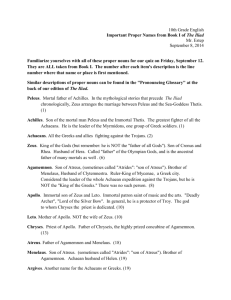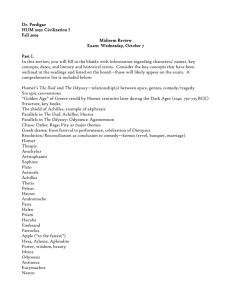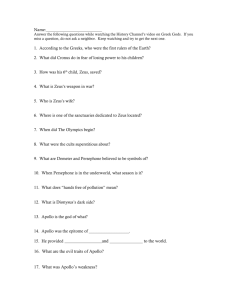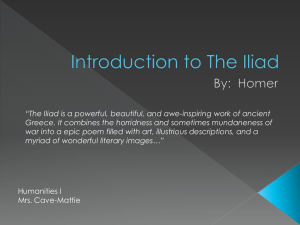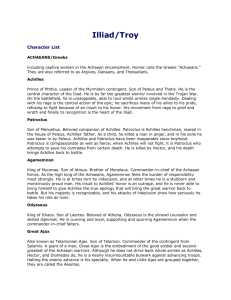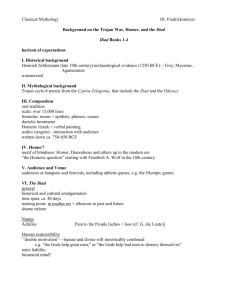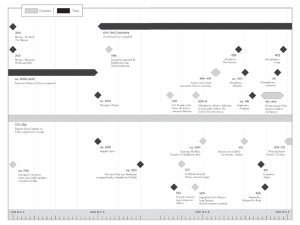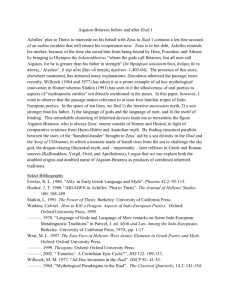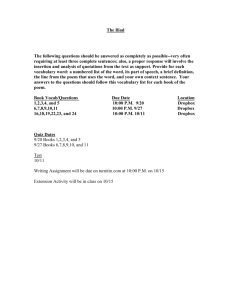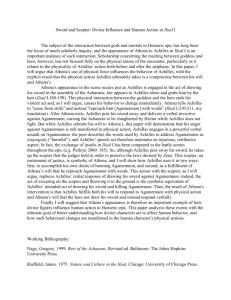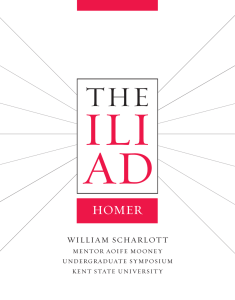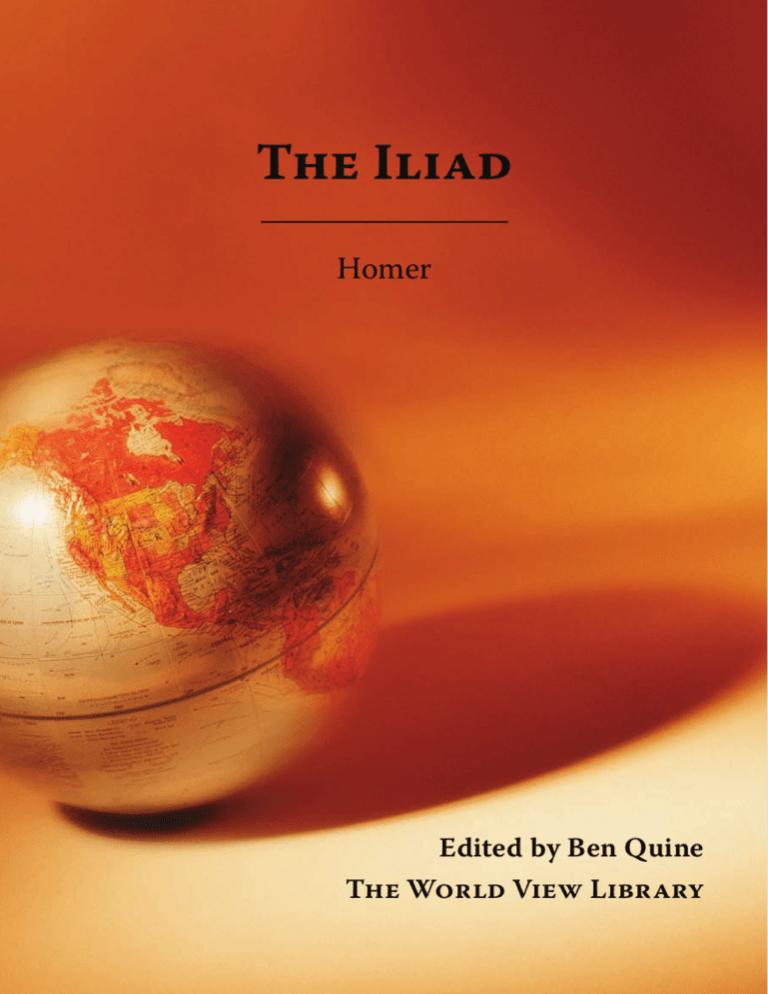
The Iliad
Homer
Edited by Ben Quine
The World View Library
HOMER
THE ILIAD
The World View Library
Edited by Ben Quine
The Iliad
from The World View Library
Edited by Ben Quine
Published by The World View Library, Dallas, Texas
2008
cover image © Dave Robertson/Masterfile
editorial material, notes, and additional text copyright © Ben Quine, 2008
All rights reserved
The copyrighted portions of this book may not be reproduced
or transmitted in any form or by any means, electronic or
mechanical, including photocopying, recording, or by any
information storage and retrieval system, without the written
permission of the publisher, except where permitted by law.
For information address:
World View Library, 3424 Westminster Ave, Dallas Tx. 75205
About the world view library
Thank you for choosing the World View Library. We are
proud to present the masterpieces of western literature in this
new edition.
A few words about the format of this book: the main body
of each page presents the original text unaltered in a clear, easy
to read format, while the outside margins contain summary
headings, definitions, and other helps. Since most of the words
in the English language have had multiple definitions over
time — and often multiple simultaneously, the definitions
given in the margins attempt to capture as closely as possible
the meaning intended by the author in the given context. Use
these notes as a beginning to your study of this book.
Every great work of art will communicate not just beauty
but also ideas about the world we live in. And so, we encourage
you to think carefully and ask questions while reading: What
ideas are presented in this work? What do the characters and
situations say about the nature of man and the universe? Is
there a God, according to the text? If so, what is He like? And
what happens to man after death?
It is our desire to help bring this classic literature to life, and
we hope that the World View Library will lead you to a deeper
understanding of the living God and His creation.
Ben Quine
august 2007
Contents
BOOK I.........................................11
BOOK II........................................29
BOOK III......................................53
BOOK IV......................................65
BOOK V........................................81
BOOK VI....................................107
BOOK VII...................................123
BOOK VIII.................................137
BOOK IX....................................153
BOOK X......................................173
BOOK XI....................................189
BOOK XII...................................215
BOOK XIII.................................229
BOOK XIV.................................253
BOOK XV...................................269
BOOK XVI.................................291
BOOK XVII................................317
BOOK XVIII..............................339
BOOK XIX.................................357
BOOK XX...................................369
BOOK XXI.................................385
BOOK XXII................................403
BOOK XXIII..............................419
BOOK XXIV..............................445
World View Library
11
BOOK I
S
ing, O goddess, the anger of Achilles son of Peleus,
that brought countless ills upon the Achaeans. Many
a brave soul did it send hurrying down to Hades, and
many a hero did it yield a prey to dogs and vultures,
for so were the counsels of Zeus fulfilled from the day
on which the son of Atreus, king of men, and great
Achilles, first fell out with one another.
And which of the gods was it that set them on to
quarrel? It was the son of Zeus and Leto; for he was
angry with the king and sent a pestilence upon the
host to plague the people, because the son of Atreus
had dishonoured Chryses his priest. Now Chryses had
come to the ships of the Achaeans to free his daughter,
and had brought with him a great ransom: moreover he
bore in his hand the sceptre of Apollo wreathed with
a suppliant’s wreath, and he besought the Achaeans,
but most of all the two sons of Atreus, who were their
chiefs.
“Sons of Atreus,” he cried, “and all other Achaeans,
may the gods who dwell in Olympus grant you to sack
the city of Priam, and to reach your homes in safety;
but free my daughter, and accept a ransom for her, in
reverence to Apollo, son of Zeus.”
On this the rest of the Achaeans with one voice
were for respecting the priest and taking the ransom
that he offered; but not so Agamemnon, who spoke
fiercely to him and sent him roughly away. “Old man,”
said he, “let me not find you tarrying about our ships,
nor yet coming hereafter. Your sceptre of the god and
your wreath shall profit you nothing. I will not free her.
She shall grow old in my house at Argos far from her
the quarrel between
Agamemnon and
Achilles
10
20
30
O goddess: The Muses
(though they are often
referred to in singular), who
were daughters of Zeus,
were believed to inspire
music, dance and poetry. The
Odyssey similarly begins by
invoking the Muse.
the anger: (or wrath) of
Achilles is a theme of the Iliad
Zeus: god of thunder and
lightning. Butler used the
Roman names for the gods,
but their Greek names have
been used here.
son of Zeus and Leto:
Apollo, god of music, archery,
prophecy, medicine and
plague. Leto, a goddess, was
one of Zeus’ first wives and
also the mother of Artemis
Chryses: priest of Apollo
suppliant: one who begs, a
humble petitioner (OEDs)
Achaeans, or Daanians, or
Argives: the Greeks
Atreus: father of
Agamemnon, leader of the
Greek armies, and Menelaus
Priam: king of Troy
12
The Iliad begins in the middle
of the action of the Trojan
War (around 1200 BC). This
dramatic technique adds
color to the tale since most
of the story, including the
causes of the war and the
characters, would have been
very well known to its original
audience.
The Iliad draws back the
curtain to make the spiritual
world visible. The Iliadic
gods are inseparable from
the story, among its main
characters, and ultimately
responsible for most of the
action.
heard his prayer: see also:
1.208-9
16.258-9 & 550
23.783
24.322-3
pyre: funeral pile for burning
the dead
Hera: wife and sister of Zeus;
queen of heaven, and goddess
of marriage and childbirth
deem: think or judge
turn roving home:
Agamemnon later proposes
the same: 9.19-26 and
14.71-82
hecatomb: a large offering to
a god. See note on pg. 23
40
50
60
THE ILIAD • BOOK 1
own home, busying herself with her loom and visiting
my couch; so go, and do not provoke me or it shall be
the worse for you.”
The old man feared him and obeyed. Not a word
he spoke, but went by the shore of the sounding sea
and prayed apart to King Apollo whom lovely Leto
had borne. “Hear me,” he cried, “O god of the silver
bow, that protectest Chryse and holy Cilla and rulest
Tenedos with thy might, hear me oh thou of Sminthe.
If I have ever decked your temple with garlands, or
burned your thigh-bones in fat of bulls or goats, grant
my prayer, and let your arrows avenge these my tears
upon the Danaans.”
Thus did he pray, and Apollo heard his prayer. He
came down furious from the summits of Olympus,
with his bow and his quiver upon his shoulder, and the
arrows rattled on his back with the rage that trembled
within him. He sat himself down away from the ships
with a face as dark as night, and his silver bow rang
death as he shot his arrow in the midst of them. First he
smote their mules and their hounds, but presently he
aimed his shafts at the people themselves, and all day
long the pyres of the dead were burning.
For nine whole days he shot his arrows among the
people, but upon the tenth day Achilles called them
in assembly—moved thereto by Hera, who saw the
Achaeans in their death-throes and had compassion
upon them. Then, when they were got together, he rose
and spoke among them.
“Son of Atreus,” said he, “I deem that we should now
turn roving home if we would escape destruction, for
we are being cut down by war and pestilence at once.
Let us ask some priest or prophet, or some reader of
dreams (for dreams, too, are of Zeus) who can tell us
why Phoebus Apollo is so angry, and say whether it is
for some vow that we have broken, or hecatomb that we
World View Library
13
have not offered, and whether he will accept the savour
of lambs and goats without blemish, so as to take away
the plague from us.”
With these words he sat down, and Calchas son of
Thestor, wisest of augurs, who knew things past present
and to come, rose to speak. He it was who had guided
the Achaeans with their fleet to Ilius, through the
prophesyings with which Phoebus Apollo had inspired
him. With all sincerity and goodwill he addressed them
thus:—
“Achilles, loved of heaven, you bid me tell you
about the anger of King Apollo, I will therefore do
so; but consider first and swear that you will stand by
me heartily in word and deed, for I know that I shall
offend one who rules the Argives with might, to whom
all the Achaeans are in subjection. A plain man cannot
stand against the anger of a king, who if he swallow
his displeasure now, will yet nurse revenge till he has
wreaked it. Consider, therefore, whether or no you will
protect me.”
And Achilles answered, “Fear not, but speak as it is
borne in upon you from heaven, for by Apollo, Calchas,
to whom you pray, and whose oracles you reveal to us,
not a Danaan at our ships shall lay his hand upon you,
while I yet live to look upon the face of the earth—no,
not though you name Agamemnon himself, who is by
far the foremost of the Achaeans.”
Thereon the seer spoke boldly. “The god,” he said,
“is angry neither about vow nor hecatomb, but for his
priest’s sake, whom Agamemnon has dishonoured, in
that he would not free his daughter nor take a ransom
for her; therefore has he sent these evils upon us, and
will yet send others. He will not deliver the Danaans
from this pestilence till Agamemnon has restored the
girl without fee or ransom to her father, and has sent
70
Ilius: another name for Troy,
so “The Iliad” is the story of
Troy
Achilles: the greatest of the
Greek warriors
80
90
100
World View Library
15
present, let us draw a ship into the sea, and find a crew
for her expressly; let us put a hecatomb on board, and
let us send Chryseis also; further, let some chief man
among us be in command, either Aias, or Idomeneus,
or yourself, son of Peleus, mighty warrior that you are,
that we may offer sacrifice and appease the anger of the
god.”
Achilles scowled at him and answered, “You are
steeped in insolence and lust of gain. With what heart
can any of the Achaeans do your bidding, either on
foray or in open fighting? I came not warring here for
any ill the Trojans had done me. I have no quarrel with
them. They have not raided my cattle nor my horses,
nor cut down my harvests on the rich plains of Phthia;
for between me and them there is a great space, both
mountain and sounding sea. We have followed you,
Sir Insolence! for your pleasure, not ours—to gain
satisfaction from the Trojans for your shameless self
and for Menelaus. You forget this, and threaten to rob
me of the prize for which I have toiled, and which the
sons of the Achaeans have given me. Never when the
Achaeans sack any rich city of the Trojans do I receive
so good a prize as you do, though it is my hands that do
the better part of the fighting. When the sharing comes,
your share is far the largest, and I, forsooth, must go
back to my ships, take what I can get and be thankful,
when my labour of fighting is done. Now, therefore, I
shall go back to Phthia; it will be much better for me
to return home with my ships, for I will not stay here
dishonoured to gather gold and substance for you.”
And Agamemnon answered, “Fly if you will, I shall
make you no prayers to stay you. I have others here
who will do me honour, and above all Zeus, the lord of
counsel. There is no king here so hateful to me as you
are, for you are ever quarrelsome and ill- affected. What
though you be brave? Was it not heaven that made you
140
Steeped: soaked, saturated
150
160
The Greeks have come to
fight Troy largely over the
abduction of Helen, who was
considered the most beautiful
woman on earth. Menelaus,
Helen’s husband, was also the
brother of Agamemnon, the
most influential and powerful
of the Greeks. Together, they
summoned the Greek armies
to war to regain Helen and
seek revenge. Achilles argues
that for Agamemnon to take
Briseis is an equal outrage to
the abduction of Helen.
toiled: laboured severely,
worked continuously or with
great difficulty
170
After a victory, it was
common practice to
distribute plunder by
awarding prizes to the
greatest warriors. Since
greater prizes led to greater
honor, prizes quickly became
one of the main motivations
for fighting.
20
The characters of the Iliad
strive primarily for glory and
honor. Glory is what is spoken
about one: ones’ reputation
or fame (especially after
death). Honor is the reward
given for heroic actions
(especially materially).
Agamemnon has threatened
to ruin Achilles’ reputation
(glory) by taking away his
war prize (honor), so he
has essentially taken away
Achiles’ reason for fighting.
Vandiver
320
330
loth: averse, unwilling
Achilles sends his
mother Thetis to
ask Zeus to help the
Trojans
hard by: near to
forthwith: immediately
Achilles’ parents: The
unusual marriage of Thetis
(a sea-goddess) to Peles
(a mortal) was arranged
by Zeus (18.415-422) and
resulted in Achilles’ favor
among the gods. But their
relationship is at this point
apparently strained or ended
as they do not interact in
the Iliad.
340
350
THE ILIAD • BOOK 1
and his ships, and ill-pleased he was when he beheld
them. They stood fearfully and reverently before him,
and never a word did they speak, but he knew them
and said, “Welcome, heralds, messengers of gods and
men; draw near; my quarrel is not with you but with
Agamemnon who has sent you for the girl Briseis.
Therefore, Patroclus, bring her and give her to them,
but let them be witnesses by the blessed gods, by
mortal men, and by the fierceness of Agamemnon’s
anger, that if ever again there be need of me to save the
people from ruin, they shall seek and they shall not find.
Agamemnon is mad with rage and knows not how to
look before and after that the Achaeans may fight by
their ships in safety.”
Patroclus did as his dear comrade had bidden him.
He brought Briseis from the tent and gave her over to
the heralds, who took her with them to the ships of
the Achaeans—and the woman was loth to go. Then
Achilles went all alone by the side of the hoar sea,
weeping and looking out upon the boundless waste of
waters. He raised his hands in prayer to his immortal
mother, “Mother,” he cried, “you bore me doomed to
live but for a little season; surely Zeus, who thunders
from Olympus, might have made that little glorious.
It is not so. Agamemnon, son of Atreus, has done me
dishonour, and has robbed me of my prize by force.”
As he spoke he wept aloud, and his mother heard
him where she was sitting in the depths of the sea hard
by the old man her father. Forthwith she rose as it were
a grey mist out of the waves, sat down before him as he
stood weeping, caressed him with her hand, and said,
“My son, why are you weeping? What is it that grieves
you? Keep it not from me, but tell me, that we may
know it together.”
Achilles drew a deep sigh and said, “You know it;
why tell you what you know well already? We went to
World View Library
27
so give him fair words, and he will then soon be in a
good humour with us.”
As he spoke, he took a double cup of nectar, and
placed it in his mother’s hand. “Cheer up, my dear
mother,” said he, “and make the best of it. I love you
dearly, and should be very sorry to see you get a
thrashing; however grieved I might be, I could not help,
for there is no standing against Zeus. Once before when
I was trying to help you, he caught me by the foot and
flung me from the heavenly threshold. All day long from
morn till eve, was I falling, till at sunset I came to ground
in the island of Lemnos, and there I lay, with very little
life left in me, till the Sintians came and tended me.”
Hera smiled at this, and as she smiled she took
the cup from her son’s hands. Then Hephaestus drew
sweet nectar from the mixing-bowl, and served it
round among the gods, going from left to right; and the
blessed gods laughed out a loud applause as they saw
him bustling about the heavenly mansion.
Thus through the livelong day to the going down
of the sun they feasted, and every one had his full
share, so that all were satisfied. Apollo struck his lyre,
and the Muses lifted up their sweet voices, calling and
answering one another. But when the sun’s glorious
light had faded, they went home to bed, each in his own
abode, which lame Hephaestus with his consummate
skill had fashioned for them. So Zeus, the Olympian
Lord of Thunder, hied him to the bed in which he
always slept; and when he had got on to it he went to
sleep, with Hera of the golden throne by his side.
570
580
the strongest: “The Iliad
centers upon telling us that
the highest good is victory,
explicitly in war. Implicitly in
art and thought: indeed in
every human endeavor. Homer
teaches ‘Agon,’ the contest
for the foremost place, a
teaching we ourselves honor
more readily in politics or in
sport or in business or in law,
than we do in the arts and
in the other realms of the
intellect and the spirit.”
Bloom notes 5
double cup: double-handed
wine cup (Fitzgerald)
consummate: highest,
utmost, supreme (OEDs)
590
“The gods of Homer, in both
the Iliad and the Odyssey, are
extremely anthropomorphic
in many ways. They are
conceived of as being human
like in shape, in appearance, in
emotions, in activities, in just
about every imaginable way.
This is not the only way to
conceive of gods. There have
been cultures who’s gods have
not been anthropomorphic.
And yet they are human-like
creatures who cannot grow
old and cannot die, whereas
humans by definition must
grow old and must die.”
Vandiver

